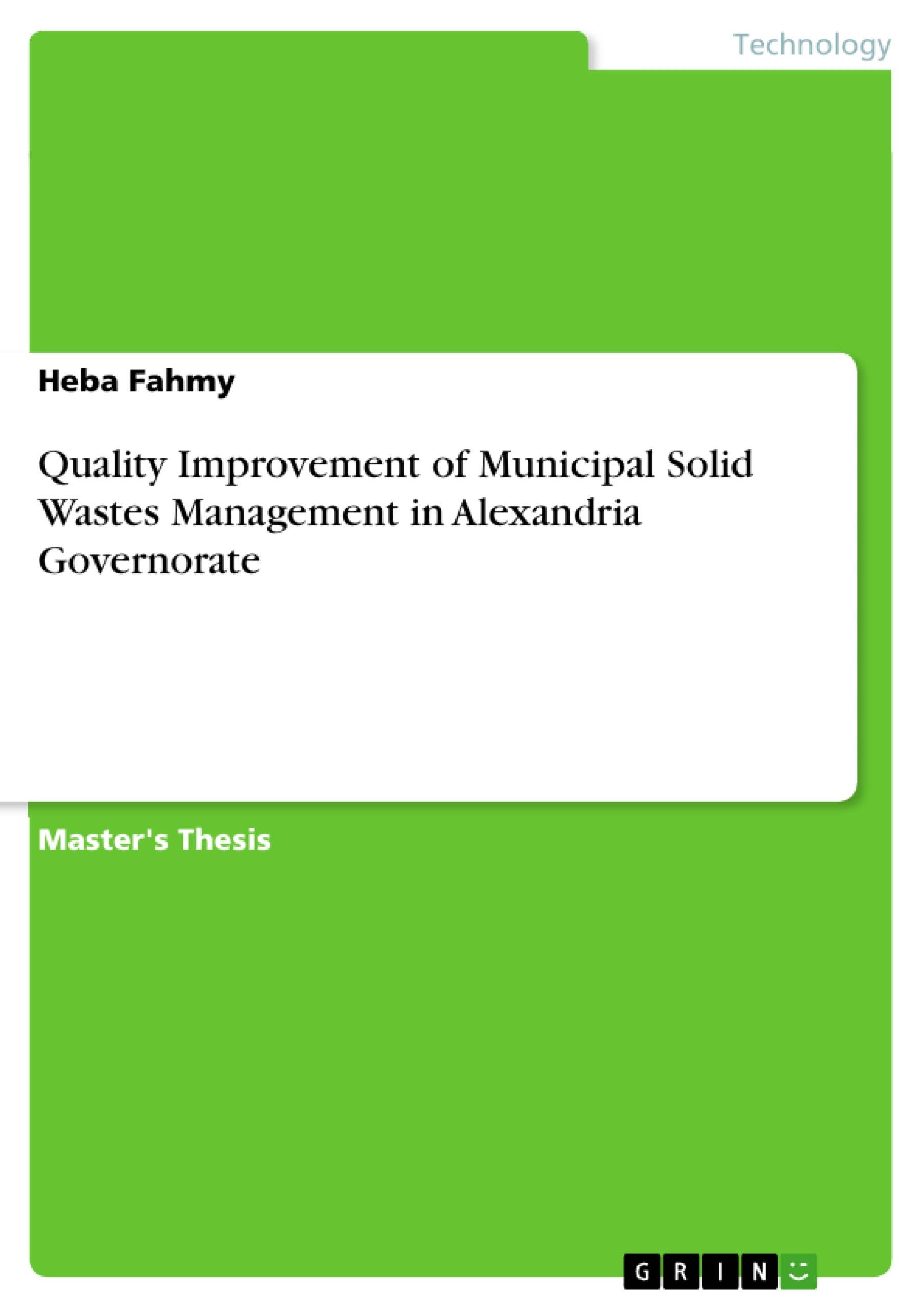Environmental quality is a prime concern to sustain the development of Egypt. Solid wastes generated from human settlements are of the major environmental issues that concern and challenge Egypt today. SWM is a crucial public service issue affecting both environment and health. SWM in Egypt have always been, and will continue to be one of the most pressing challenges facing the Egyptian authorities for the coming decades unless appropriate solutions are derived.
The intention of this search is to implement Quality Improvement Techniques in Environmental Engineering Field to analyze the Egyptian Waste Management problem and find applicable solutions according to the current situation givens. The main focus is on municipal solid wastes excluding hazardous wastes from it.
SWM problem in Egypt can be summarized as the absence of a regular waste collection service; waste is dumped in open spaces, on access roads which are invaded by animals and waste pickers so, wastes are scattered and serve as breeding grounds for disease vectors and with the leachate from decomposing garbage nearby water sources and soil which results in food contamination, all this have serious environmental consequences. Alexandria, the second capital of Egypt is taken as practical case study of this search.
The field of solid waste management is as old as human beings age. Since that waste is a product that is commonly developed due to human living. This sector has been of such concern for all cultures all along the history because of its significant effects on both the human health and his surrounding environment. The effects on health appears in terms of disease spread like cholera and plague; that were really developed due to poor means of handling solid wastes at this time. While the significant effects that could affect the environment appear in terms of land degradation and soil contamination.
But a huge gap has occurred in the development and improvement of this field between developed and developing countries along time. In developing countries like Egypt, the situation is deteriorated in terms of inadequate waste collection service resulting in poor waste collection coverage efficiency that led to waste “garbage” spread on the access roads of the cities. [...]
Inhaltsverzeichnis (Table of Contents)
- Acknowledgement
- Declaration
- Abstract
- Summary
- Chapter 1: Introduction
- 1.1 Solid Waste Management
- 1.2 Waste Generation and Composition
- 1.3 Waste Management Methods
- 1.4 Solid Waste Management in Egypt
- Chapter 2: Literature Review
- 2.1 Solid Waste Management Systems Worldwide
- 2.2 Waste Management Challenges and Solutions
- 2.3 Environmental Impacts of Waste Management
- Chapter 3: Materials and Methods
- 3.1 Case Study: Alexandria Governorate
- 3.2 Data Collection and Analysis
- 3.3 Quality Improvement Techniques
- Chapter 4: Results and Discussion
- 4.1 Current Waste Management Practices in Alexandria
- 4.2 Assessment of Waste Management System
- 4.3 Recommendations for Improvement
- Chapter 5: Conclusion
Zielsetzung und Themenschwerpunkte (Objectives and Key Themes)
This thesis investigates the challenges and opportunities related to municipal solid waste management (SWM) in Alexandria, Egypt. The study aims to implement Quality Improvement Techniques to analyze the existing SWM system and propose practical solutions to address identified deficiencies. The main objectives include:- Analyzing the current SWM practices in Alexandria.
- Identifying the key challenges and bottlenecks within the SWM system.
- Evaluating the potential for improvement using Quality Improvement Techniques.
- Formulating specific recommendations to enhance SWM efficiency and sustainability.
Zusammenfassung der Kapitel (Chapter Summaries)
Chapter 1 introduces the concept of SWM, discussing various methods and the global context. It also provides specific insights into SWM practices in Egypt, highlighting the existing challenges and the need for improvement.
Chapter 2 delves into the existing literature on SWM, reviewing international practices and analyzing the challenges faced in different regions. The chapter also explores the environmental impacts of various SWM methods and their potential consequences.
Chapter 3 details the research methodology, including the case study of Alexandria Governorate, the data collection methods used, and the Quality Improvement Techniques employed in the analysis.
Chapter 4 presents the findings of the research, providing a comprehensive assessment of the current SWM practices in Alexandria. It discusses the identified weaknesses and challenges, as well as the potential for improvement based on the application of Quality Improvement Techniques.
Chapter 5 summarizes the key findings of the thesis and offers a conclusion regarding the potential for effective and sustainable SWM in Alexandria. It also presents actionable recommendations for policy makers and stakeholders to improve the efficiency and environmental impact of SWM in the region.
Schlüsselwörter (Keywords)
The keywords associated with this thesis include municipal solid waste management, quality improvement techniques, Alexandria Governorate, environmental engineering, waste collection, waste disposal, recycling, sustainable development, and environmental impact assessment.Frequently Asked Questions
What is the focus of the solid waste management study in Alexandria?
The study focuses on improving the quality of municipal solid waste management (SWM) in Alexandria, Egypt, by applying environmental engineering techniques.
What are the main environmental challenges identified in Egypt's waste sector?
Key challenges include the absence of regular collection services, open dumping, and the resulting contamination of soil and water through leachate.
How does the study propose to analyze the waste problem?
It utilizes "Quality Improvement Techniques" to assess current practices and identify practical, applicable solutions for the Egyptian context.
What are the health risks associated with poor waste management?
Poor handling of solid waste can lead to the spread of diseases such as cholera and plague, as well as serving as breeding grounds for disease vectors.
Does the research cover hazardous waste?
No, the main focus is specifically on municipal solid wastes, excluding hazardous materials from the primary analysis.
What recommendations are provided in the thesis?
The thesis offers actionable recommendations for policy makers to enhance waste collection coverage efficiency and sustainable disposal in Alexandria.
- Arbeit zitieren
- Heba Fahmy (Autor:in), 2014, Quality Improvement of Municipal Solid Wastes Management in Alexandria Governorate, München, GRIN Verlag, https://www.grin.com/document/285558



